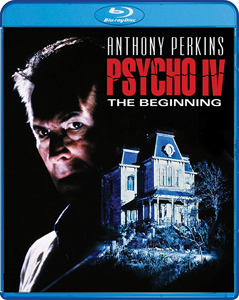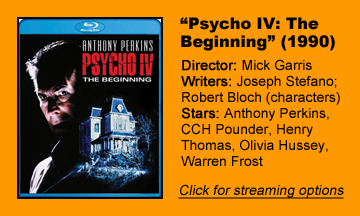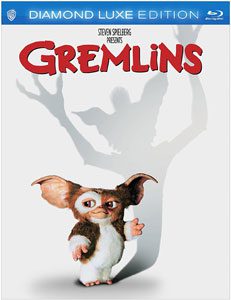We all go a little mad sometimes, so from Nov. 27-Dec. 11 we’re dragging the swamp behind the Bates Motel for insight into the films of the “Psycho” franchise. Next up is “Psycho IV: The Beginning” (1990):
A novelty at the time
I remember liking “Psycho IV: The Beginning,” I think because at the time of my VHS rental viewing in the 1990s it was a novelty to get the backstory of Norman Bates (Anthony Perkins and Henry Thomas). But “Bates Motel” (2013-17) has since revealed the relative thinness of this made-for-TV movie, which I now rank as the weakest of the original “Psycho” quadrilogy.
Boy, does it start with promise though. Joseph Stefano, the writer of 1960’s “Psycho,” returns to tell us what shaped Norman into a killer. The framing mechanism wherein Norman calls into Fran Ambrose’s (CCH Pounder) talk show about sons who kill their mothers is compelling. But it lacks a good payoff.
I am more shocked that there is no surprising revelation than I would be by any actual surprising revelation. Norman is fixing dinner and he tells Fran he’s waiting for his wife, Connie (Donna Mitchell), to come home from her job at the mental institution with his birthday cake.
Holes in the logic
Norman and Connie met at the institution when he was a patient, but now he’s free on parole, he says. There’s no logical way any of this can be true (Why would Norman be released? How would Norman attract a woman? Etc.). But it turns out it is true, and I’m flabbergasted.
As was settled in the previous sequels, Norman was shaped by “nurture” – the way Norma (Olivia Hussey) treated him – rather than nature, i.e. genetics. But Norman himself still has to figure that out, so the main draw of “Psycho IV” is simply seeing Norman and Norma back in the day, in flashbacks.
With “Bates Motel’s” Freddie Highmore and Vera Farmiga now in my head, this backstory plays shallowly by comparison. Thomas is fine in scenes where he’s the victim of his mother’s psychological abuse; Norma blames her ailments on his difficult birth, behaves provocatively around him yet criticizes his sexuality, dresses him up like a girl and locks him in a closet.
On Fran’s radio show, Norman says times weren’t all bad, but Stefano and director Mick Garris almost entirely show us the bad times.
A one-sided Norma
The casting team might’ve figured having the kid from “E.T.” play Norman would create a factor of unease, but Thomas is blank-faced when Norman’s in killing mode, and it doesn’t help that he looks nothing like Perkins. Hussey is OK as the bipolar Norma; I can look past her accent and see that Farmiga might’ve drawn something from Hussey’s performance.
But again, Norma is mostly a horrible mother in the moments this movie chooses to highlight. There aren’t enough loving moments to underscore the tragedy of Norman’s hope for having a stable mother.
To be fair, “Psycho IV” mainly comes off poorly because “Bates Motel” ended up being such a masterpiece. It’s not totally without merit, and it was probably a thrill to see a sequel to a major franchise on over-the-air TV.
Perkins (who died two years after this film, at age 60) and Pounder are such good actors that the radio conversation builds toward something. Stefano can’t deliver that something, but Norman and Fran do hold my attention.
Back to the motel
It’s neat to see the rundown version of the motel and house in the climax. A lot of “Psycho IV” takes place in Fran’s black-box style radio studio and Norman’s kitchen because of the TV budget, so it’s refreshing how it opens up visually at the end. But by that time, I was thinking of how absurd it is that Norman has a healthy adult relationship and that he has been let out of the institution.
To top it off, Stefano has the nerve (or lack of nerve?) to give Norman a happy ending. This unstable mass murderer is free both legally and psychologically to live happily ever after with an underdeveloped supporting character. The “Of Mice and Men”-style ending of “Bates Motel” makes more sense. But then again, that show digs into the tragedy of the fact that some minds don’t heal.
In the “Psycho” film series, Norman’s mind does heal. In the abstract, that doesn’t strike me as the right ending, but what’s worse is that Stefano doesn’t earn it.
This film gives us hardly any scenes showing Norman’s healing, aside from the stagey climax itself. “Psycho IV” reveals how a man turns into a mass murderer, then skims over how he stops.
Schedule of “Psycho” reviews:
Friday, Nov. 27: “Psycho” (1960)
Wednesday, Dec. 2: “Psycho II” (1983)
Friday, Dec. 4: “Psycho III” (1986)
Wednesday, Dec. 9: “Psycho IV: The Beginning” (1990)
Friday, Dec. 11: “Psycho” (1998)



